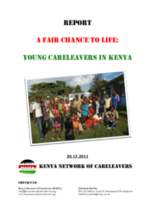Displaying 891 - 900 of 956
Documenting the young people‘s own views of what has happened during the time of leaving care and afterwards, this study explores in-depth the experiences of care leavers during the dynamic phase following their separation from an institutional care setting.
This monograph reviews literature pertaining to children without permanent parents.
This article, from the Children and Youth Services Review special issue on ‘Young People's Transitions from Care to Adulthood’ examines the school performance and psychosocial wellbeing of care leavers in Sweden.
Few local authorities had elaborated programmes or routines for care leaving. Many small municipalities had few young people in care, which made it difficult to organise elaborated programmes for care leaving. Manager’s expected a rapid and linear transition to adulthood. Little awareness of the yo-yo transition pattern common for other young people. Managers were worried that continued contact with social services would lead to young people being dependant on support. Only 6% of managers had any information of young people’s whereabouts, once they had left care.
The aim of this article is two-fold. Firstly, to present a critical discursive analysis of young people's accounts of themselves in the transition from care. Secondly, to shed light on three different ways of making the transition from care; transition through a break with the past after moving out, transition through continuing change and transition as a way of dealing with the risk of further problems in their lives.
This paper explores how the UNCRC reporting process, and guidelines from the Committee outlining how States should promote the rights of young people making the transition from care to adulthood, can be used as an instrument to track global patterns of change in policy and practice.
This paper explores the research evidence from England and France on the mental health of young people aging out of care and into adulthood.
In December 2011, the Children and Youth Services Review released a special volume (32) focused on "Young People's Transitions from Care to Adulthood."
The study explores the post-care experiences of young Jordanian care leavers. Material struggles were similar to peers internationally. The distinct difference for Arab care leavers was the cultural influence. Patriarchy, family life and collectivism impact the care leavers' experiences. A cultural dimension increases understanding of leaving-care.
This paper discusses findings from a qualitative longitudinal study which explored the process of leaving long-stay institutional state care in Romania during 2002–4, a period at the heart of accelerated EU-enforced childcare reform.

